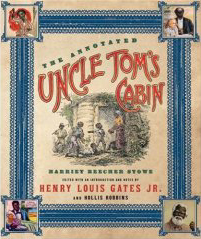 Here's a book review of The Annotated Uncle Tom's Cabin, submitted to Amazon before Thanksgiving, and not posted. It's been modified slightly to include links. I should know better than to be co-opted by Amazon. They pretend to welcome diverse review opinion but not if it might harm book sales.
Here's a book review of The Annotated Uncle Tom's Cabin, submitted to Amazon before Thanksgiving, and not posted. It's been modified slightly to include links. I should know better than to be co-opted by Amazon. They pretend to welcome diverse review opinion but not if it might harm book sales.I presume they wouldn't post it even though I gave the book three stars, because it expresses cynicism about Gates' hucksterism, and recommends reading the standard edition first (which Updike also does). That wouldn't do for a first review. So "be the first person to review this book" remains up on Amazon.
You have to be a literary Uncle Tom, to get published "in the house." "Yes Mas'r Amazon, a fine book--a fine fine book!"
The review:
-------------------------------------------------------------
John Updike reviews this new edition in the Nov 6 New Yorker, which is available online and which I recommend. With 100 pages to go, Updike tired of the "irritable sniping from the sidelines" and switched to the standard Library of America edition.
The Boston Globe interviewed Henry Louis Gates for its Nov 12 issue. In the interview Gates is quick to toss the accusation of racism--"the book is dripping with--how do I put it politely, contextual racism. I made a list of every time Stowe uses the term 'woolly headed niggers.' She must have used that phrase 200 times....That kind of racism makes it hard to get new black readers through the first chapter."
200 times? If blacks are disinterested in the novel because they think it's racist, Gates doesn't help by exaggerating the frequency of the use of the term, then equating that with racism.
Unless it's calculated. He seems to be playing to one audience when speaking--one that will react favorably to a facile accusation of racism, and to another when writing, one that is actually interested in the historical context. Ostensibly he's trying to attract the first to join the second, and uses the "intrusive" (the Globe's term) annotations, he calls it a "call and response", to provide a format more familiar to blacks. Like how black people talk back to the screen at the movies, he says.
After claiming the work is racist, he positions himself as its righteous heckler. Thus under the guise of making the novel more attractive to black readers, he can be both a member of the black audience at the movies, free to heckle on the one hand, and a "literary critic" on the other. Since the former is exempt from criticism he can then use it as cover to take potshots that another literary critic couldn't get away with. He gets to have it both ways.
In the annotations themselves though, he and Hollis Robbins explore the nuance and complexity of racism missing from his interview. Rather than tossing off some flippant "200 times" remark, they praise Stowe for her accurate rendering of slave speech. "Use of the appellation 'nigger' in slave-to-slave conversation contrasts sharply with the demeaning racist term 'nigger,' used by Haley in chapter 1. Stowe's depiction of dialogue among the slave characters is very contemporary sounding and surprisingly accurate..."
And later: "Again, Stowe is uncannily accurate in her depiction of playful conversation between these two male slaves."
I read Uncle Tom's Cabin in a book group a few months ago, and reviewed it here in Amazon (as "Nils Kelly"). This edition contains a wealth of useful background, including a lot that went right over my head when reading the original. But if you're interested in reading it, and you should be, do what Updike did. Get a standard edition and read it through--it's a cracking good read. Let the book stand on its own, without the distraction of the "editorial heckling" (Updike's term). Then when you are finished, have a look at this edition.

2 comments:
Hollis thanks for stopping by. I shouldn't be surprised to see that you found this obscure blog. Thanks to Google blog watch I suppose.
I rewrote and resubmitted the Amazon review. In retrospect irritation with your co-editor's posturing in that interview shouldn't spill over into my opinion of the work itself. I can only infer the marketing difficulty you face. I do question the soundness of Henry's approach to get more black readers, which in that Globe interview seemed to be to pander to their supposed cultural urge to heckle. Which seems patronizing to me--just to sell a few more books? If that's what he was doing.
Amazon posted the new review, in the space of five minutes. I'm sure it wasn't read and approved by a human that quickly.
It makes me wonder if the earlier review was rejected by a rejecto-bot because it contained the word "nigger" more than once, even though it was quoting one of the editors?
I hope not.
Post a Comment